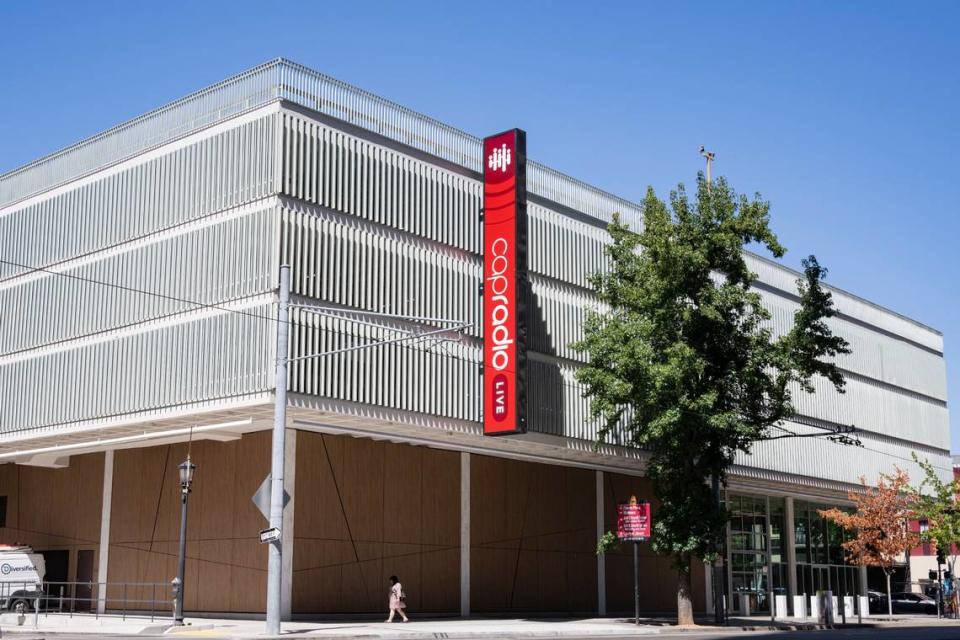Congress debating $850,000 for CapRadio, but Sacramento State questions how to spend it
- Oops!Something went wrong.Please try again later.
Congresswoman Doris Matsui has included an $850,000 appropriation for Capital Public Radio’s proposed move downtown in a House bill now under debate, but how the troubled operation will spend the money and whether it actually moves is still unclear.
The Sacramento Democrat originally sought $2 million for the CapRadio project. Republicans control the spending process in the House, where the amount was whittled down to $850,000.
“The funding would be used to equip CapRadio’s new downtown Sacramento headquarters with state-of-the-art production and operations equipment,” Matsui’s website says.
Whether CapRadio actually moves into a new downtown headquarters is still up for debate as Sacramento State, which holds its broadcast license, tries to correct management and spending issues that resulted in layoffs and could leave CapRadio insolvent by January.
If the spending proposal makes its way through the process, the university still does not know how it might spend the money.
“We don’t know at this point,” Sac State spokesman Brian Blomster said Wednesday. “It was meant to support the downtown move.
“Right now, the main concern of CapRadio and the university is to address the most pressing needs of getting CapRadio on track organizationally and financially. Options for a possible downtown move are being considered and will be considered, but no determination has been made yet on what eventually is going to be done.”
CapRadio announced plans four years ago for a move from its campus headquarters to downtown Sacramento, one that eventually envisioned the staff doubling to 140 employees with a headquarters building at 730 I St. and a performance center at 1010 8th St.
The lease for the I Street headquarters runs through 2037, with monthly rent payments beginning at $68,976 after the first year of occupancy, when no monthly payments were required, and increasing to $97,439 at the end of the contract.
That building is owned by 730 I St. Investors LLC, which includes Sacramento developer Bay Miry — whose wife, Katherine Bardis-Miry, joined the CapRadio board of directors in July 2019.
CapRadio signed the lease with her husband on March 1, 2021, and documents show Bardis-Miry removing herself from a lease discussion at an October 2019 board meeting.
Bardis-Miry and several other board members subsequently resigned in the wake of a scathing audit of CapRadio’s finances and management that was released last month.
That audit by California State University’s Chancellor’s Office, which oversees the CSU system’s 23 campuses, found widespread financial problems, including more than $1.1 million in studio equipment and furniture loans taken out without approval by CapRadio’s board and failure to review credit card charges.
Sac State University President Luke Wood, who took over at the school in July, has said saving CapRadio is critically important, but that the operation was the victim of a lack of accountability and proper procedures.
“What happened is total financial mismanagement...” he told The Bee last month.
Since the release of the audit, the university has taken over financial control of CapRadio but left programming and journalistic functions to CapRadio employees.
The NPR affiliate broadcasts from Redding to Modesto and operates KXJZ-FM (90.9), KXPR-FM (88.9) and a network of repeater stations, including KUOP-FM (91.3). CapRadio also manages North State Public Radio, which has two FM stations owned by Chico State, and KHSU (90.5 FM), a station owned by Cal Poly Humboldt.
Matsui proposed the $2 million community service project after CapRadio approached her office for funding, and the congresswoman said she was not pleased that the amount had been reduced to $850,000.
“Community Project Funding injects federal dollars directly into projects that will make a meaningful difference for our community,” Matsui said, blaming Republicans for the cut.
“Local newsrooms like CapRadio do a critically important public service to keep our region informed,” she said. “I will continue to advocate for all of our district’s projects and closely monitor developments as we continue through the appropriations process.”
Matsui made her initial pitch for the funding in a March 31 letter to leaders of the House Appropriations Committee, which writes spending bills.
Matsui wrote how the money “would be used for the acquisition, construction, reconstruction, or installation of a public broadcasting facility and other improvements.”
She added that “the project is an appropriate use of taxpayer funds because Capital Public Radio provides a critical public service for free to all including updating the public during ongoing emergencies. Expanding the broadcast capabilities of Capital Public Radio will increase this public benefit.”
Her letter appeared to fit the rules established in 2021 for lawmakers seeking what are called “community funding projects.”
Through this process, each member is allowed to recommend 15 local projects, or earmarks, to be included in spending bills.
They have to detail publicly why a project is needed, and show why they have no financial interest in the project. Profit-making entities are not allowed to get project money.
The CapRadio money is part of a massive bill that funds transportation and housing programs. The Senate has passed its version of the bill. The House debated it this week but has not taken a final vote.
Matsui got 10 projects included in the House bill.
They include: Sacramento River docks planning and design for improvements, $1.5 million; Sacramento Avenue Phase I, complete street project, $1 million; Elk Grove zero emissions vehicle municipal infrastructure, $1 million and Dos Rios light rail station, $1 million.


